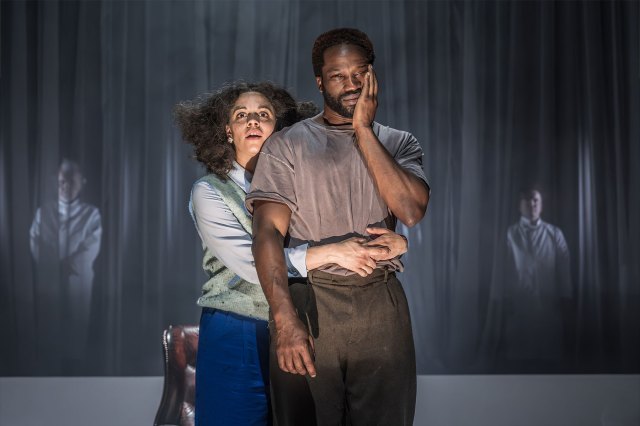Rhinoceros at the Almeida Theatre – review
Omar Elerian’s production of Eugène Ionesco’s absurdist satire runs until 26 April

Nothing dates as quickly as the avant-garde. The French Romanian playwright Eugène Ionesco was one of the key figures of 20th-century theatre, a pioneer of what came to be known as Theatre of the Absurd, a regular study for students at A-level and beyond.
When Rhinoceros, written in 1959, opened at the Royal Court in London a year later, it starred Laurence Olivier and Joan Plowright, part of a wave of plays changing theatre alongside those by Samuel Beckett and Harold Pinter. Yet it hasn’t been seen here since a revival in 2007.
Omar Elerian’s new production at the Almeida is a welcome attempt to reassess a play about conformism. Although widely seen as a critique of postwar fascism, its general theme about the individual and the herd, about the need to speak out and stand up, couldn’t be more timely. It doesn’t need passing references to tech billionaires who want to colonise Mars to make it feel bang up to date.
As translator as well as director, Elerian has added an additional layer of complication to the story of a small French village where everyone turns into a rhinoceros – apart from the slovenly Berenger (Ṣọpẹ́ Dìrísù, of Gangs of London fame), who asserts his right to resist. Elerian emphasises the way the parable is set in a theatre by introducing the figure of a narrator (the wonderfully wry Paul Hunter) who begins the evening by leading the audience in hand gesture games.
The willing suspension of disbelief in which the room is engaged is further underlined by the way in which the narrator reads Ionesco’s stage directions. A superb ensemble cast – also including Anoushka Lucas and Joshua McGuire – stand on a minimalist wide, white set by Ana Inés Jabares-Pita and mime the scene described. Later, they assemble at tables at the side, working like foley artists, adding effects to Elena Peña’s increasingly sinister soundscape.
The results of this conscious manipulation are often very funny: the tables suspended on their hands, a little stumble up a step, or a turn in the wrong direction, Dìrísù’s slight look of surprise when his raised hand makes the sound of a knock at the door. This stylised approach continues when the rhinoceros first appear. Kazoos, handed out to the audience, signify the transformations: our imaginations must do the rest.

The disadvantage of this approach is that it makes an unwieldy play even longer and sets its humour around it, rather than arising from the script. The great tranches of debate about the philosophical nature of what is going on, the speeches by logicians, lawyers, townspeople, all circle endlessly around the same arguments, and although Ionesco’s general point is clear from the start, he picks away at the different ways in which people surrender their individuality.
What makes it compelling, however, are performances that fully engage with the world they are creating. Alan Williams, Sophie Steer, John Biddle, Hayley Carmichael and Hunter reveal precise comic timing – and wild hair – in their many interventions as part of the ensemble. Lucas is charming as an eccentric Daisy – at one point breaking into a love song in Italian, presumably just because she can – making her ultimate concession to the general mood all the sadder. As Berenger’s best friend Jean, the sophisticate yin to his dishevelled yang, McGuire is wide-eyed and funny, his physical transformation into a rhinoceros – the only one we see – is beautifully achieved.
But it’s up to Dìrísù to hold the centre of the play, and he does so with a befuddled gravity, a constant sense of slow-moving bemusement as he attempts to understand why the world sees something so differently from him. “We have our own moral values which are incompatible with the ones of these animals,” he argues, gently. He passionately and powerfully charts the play’s final arc, where the stage darkens and fills with smoke, leaving Berenger frightened and alone, yet clinging to the sense that he must not surrender.
It’s a terrific final image in a production that intelligently reminds us of the play’s important and complex message – without ever quite resurrecting its impact as groundbreaking drama.















